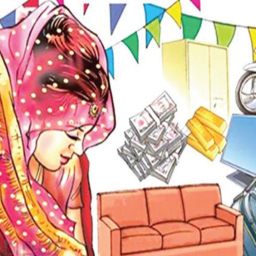Introduction
Adoption means a process of creating a parent-child relationship between parents and child or legal transfer of child to adopting parents. Adoption is considered as a good way to give a good life to those children who do not have parents or the ones whose parent abandon them for some reason. Adoption is also a way of the adopting couples to have a better and happy life. But since Adoption falls within the scope of Personal laws, the Indian scenario is unlikely to have a scope for a uniform law among the different communities. Therefore, the different religions have their own personal law related to adoption. The practice of adoption is present in India since Ramayana and Mahabharata times. Although, the purpose for which adoption is done changes with the change in culture, traditions and other practices. This often ranges from the humane motive of caring for and raising an abandoned or impoverished child, to affection toward children, and to have a child who can take care of their guardian in old age and can perform the last ritual rites after their death[1].
In 1915, privacy council in Bal Gangadhar Tilak v. Shrinivas Pandit case held that under Hindu law, the purpose of Adoption is not only to carry forward the name of the father, but also it is a mean through which various religious and cultural rights and practice can be done in which the involvement of a son is mandatory[2]. However, adoption is not allowed under the Muslim, Parsis, Jews and Christian’s law in India. So, the adoption is done through the Guardians and Wards Act, 1890 in these communities. Under the Hindu adoption and Maintenance act, 1956(HAMA), Indian citizens who are Hindu, Sikhs, Buddhist, and Jains, are allowed to adopt a child. This act brought new reforms that liberalize the institution of adoption.[3] Three laws govern adoption in the country:
- The Hindu Adoption and Maintenance Act, 1956[4](HAMA)
- The Guardians and Wards Act, 1890[5],
- The Juvenile Justice (Care and Protection) Act, 2000[6]
In India, Central Adoption Resource Authority (CARA) is the nodal agency which is mandated to regulate and look upon the adoption within India and adoption done by foreign people. It is an autonomous and statutory body set up in 2015 under the Ministry of Women and Child Development in government of India. The adoption of surrendered (parents legally gave up custody), abandoned (parents have deserted) and orphaned (parents have died) children are all regulated by CARA.[7][8]
RIGHT TO ADOPT AS FUNDAMENTAL RIGHT
In legal arena the question of considering Right to Adopt as Fundamental Right arises in Payal Sharinee v. Vinayak Pathak[9] case in 2009. The facts of the case is that the petitioner had a daughter and were assumed to have a custody of another baby girl of five months whose parents legally gave up the custody of that girl. The girl resided with petitioner for four years and then the couple decided to adopt that girl child. But there is restriction of adopting same sex children by Hindu Maintenance and Adoption act. Bombay high court in this case noted that adopting a child is an integral component of Right to Life (Article 21) of Constitution of India[10]. The Right to life not only safeguard the Rights of children who are in need of particular care and protection but also individuals and parents who desire to have children and wants to complete their family. Therefore, in this case it was held that the restriction on adoption of children of same sex with the respect to biological child by the HAMA should be removed by providing statutory provisions in the Juvenile Justice Act.
In Philips Alfred Marvin v. V. J. Gonsalves [11]case, it was held that an adoption done by church will be held legal even if there is no customary law which allow for the adoption. From these judgements, the judicial activism by apex court is cleared to consider right to adopt as Fundamental rights under the ambit of Article 21 of Indian constitution[12].
But this perspective altered with the ruling in the matter of Shabnam Hashmi v. Union of India and Others[13]. In this case, a Muslim woman wants to adopt a girl child but the same is prohibited according to The Muslim personal laws. The Court adopted a new perspective and accorded adoption rights to people of other religions under the J. J. Act. It reaffirmed the position of J. J. Act as a secular law for adoption and provided that every person has the right to adopt irrespective of their religion only if they fulfil all the condition as prescribed. However, the Court rejected the argument that the right to adoption constituted a right contemplated within the Right to life. The court pointed out that this all depends on parliament to satisfy the need of time of providing the rights by Uniform civil code which is there in DPSP. The requirement of a uniform law for future generations is to create a Uniform Civil Code once there is “a dissipation of divergent thinking processes… prevalent in the country”.[14] The Apex Court endeavoured to dismiss the problem in this instance by having recourse to Uniform Civil Code. This judgement is a huge setback for many adopting parents and children. The ruling brings the necessity of a need to change our adoption rules so that the pleasure of motherhood may be shared by any person irrespective of his religion.[15]
Conclusion
Adoption in India witnessed significant transformations from ancient to contemporary times. The idea of adoption evolves from time to time. Previously, adoption is treated by personal legislation which explicitly binds the individuals of each faith. But following the application of Juvenile Justice Act, 2000 which modifies the concept of adoption is changed for other religions that prohibit it. The Supreme Court has issued verdict that it is not the correct time to bring it within scope of fundamental right since this is against the customs and beliefs of many religions. The remedy for this issue is the enforcement of Uniform civil code under Article 44 by the Parliament, and then this ruling may be amended. It is a desire of many individuals from other religion who wishes to adopt a kid but is unable to do it because they are not allowed rights to do so under their own personal law.
Recommendations
The Right to adopt as a Fundamental right would complete the lives of childless couples and parentless kids as it is their right to have a full fledge family. The issue of rising number of orphan kids can only be remedied by the people adopting the youngsters. Even the parents who are unable to adopt a kid due to any circumstances might have the opportunity to experience the parenting. It becomes obligation upon the legislator to make right to adopt and be adopted within the scope of Fundament right so that the parents without the child and orphans and receive some sort of solace. But there is also problem with respect to religion of parents and children. There may be possibilities that a Hindu boy of age 10 years old will find it difficult to maintain with the tradition and culture of Muslim parents. It may be possible that the adoptive parents are not able to accept that child because of his religion. So every aspect must be considered before taking any legislative action.
Author(s) Name: Abhay Shankar Yadav (National University of Study and Research in Law, Ranchi)
References:
[1] “B.M. Gandhi’s FAMILY LAW, vol 1 (second edition, eastern book company 2021)
[2] Bal Gangadhar Tilak v. Shrinivas Pandit (1915) 17 BOMLR 527
[3] Hindu Adoption and Maintenance Act, 1956
[4]Ibid
[5]Guardian and Wards Act, 1890
[6]Juvenile Justice (Care and Protection) Act, 2000
[7] Romit Agrawal, ‘Adoption: Under Hindu, Muslim, Christian and Parsi Laws – Requirements for a Valid Adoption’(Legal Service India) <https://www.legalserviceindia.com/articles/hmcp_adopt.htm> accessed on 10 January 2022
[8]Divya Gandhi,’ “The Nowhere Children”, (The Hindu, 31st October 2015) <https://www.thehindu.com/features/magazine/divya-gandhi-on-the-new-adoption-guidelines-in-india/article7823071.ece> accessed 10 January 2022
[9] Payal Sharinee v. Vinayak Pathak 2010(1) BomCR 434
[10] Constitution of India, 1950, art 21
[11]Alfred Marvin v V. J. Gonsalves AIR 1999 Ker187
[12] Constitution of India (n 10)
[13] Shabnam Hashmi v Union of India and Others AIR 2014 SC1281
[14] “Perils Of Restraint”, The Indian Express, 26 February 2014)<https://indianexpress.com/article/opinion/columns/perils-of-restraint/> accessed 10 January 2022
[15] Abhy5u , ‘Fundamental Right to Adopt: A Critical Analysis of Competency of Persons in Adoption Process’ (Ipleaders, 24 March 2017) <https://blog.ipleaders.in/fundamental-right-to-adopt-a-critical-analysis-of-competency-of-persons-in-adoption-process/ > accessed 13 January 2022















